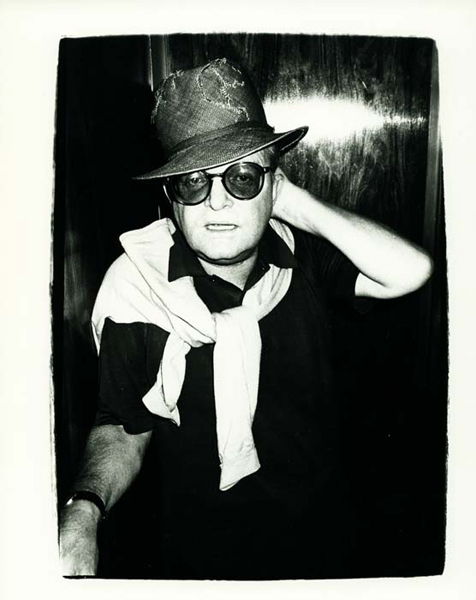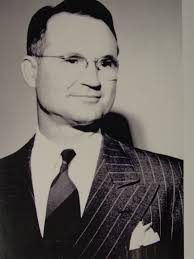 Dick and Perry have finally been apprehended for their crimes. The dream plan has come to an end, and it seems that their partnership has too. Once they're imprisoned, the promise to back each other up is broken when one pins all the blame on the other. Why does this character act in this way, and why is it that only one of them decides to tell the entire truth? And when the truth finally is told, who do people, us included, feel more sympathy for, Dick or Perry?
Dick and Perry have finally been apprehended for their crimes. The dream plan has come to an end, and it seems that their partnership has too. Once they're imprisoned, the promise to back each other up is broken when one pins all the blame on the other. Why does this character act in this way, and why is it that only one of them decides to tell the entire truth? And when the truth finally is told, who do people, us included, feel more sympathy for, Dick or Perry?
Friday, November 13, 2009
Betrayal and Motivation
 Dick and Perry have finally been apprehended for their crimes. The dream plan has come to an end, and it seems that their partnership has too. Once they're imprisoned, the promise to back each other up is broken when one pins all the blame on the other. Why does this character act in this way, and why is it that only one of them decides to tell the entire truth? And when the truth finally is told, who do people, us included, feel more sympathy for, Dick or Perry?
Dick and Perry have finally been apprehended for their crimes. The dream plan has come to an end, and it seems that their partnership has too. Once they're imprisoned, the promise to back each other up is broken when one pins all the blame on the other. Why does this character act in this way, and why is it that only one of them decides to tell the entire truth? And when the truth finally is told, who do people, us included, feel more sympathy for, Dick or Perry?
Subscribe to:
Post Comments (Atom)



After Dick and Perry thought that this whole murder case was over, they were found, and they were wrong. On December 30th both Dick and Perry were apprehended in Las Vegas and awaited Dewey in the Las Vegas police station. Along with Dewey were his three agents, Nye, Duntz, and Church and two by two they split up and began to question the two suspects (Dick and Perry). Dick acts cool at first but after awhile he breaks while Perry has no clue what is happening to him. Nye and Church, the two KBI agents who are questioning Dick show him picture of boot prints and the scene of the murder, which happen to match Dick’s boots. After seeing those photographs he blames the entire murder on Perry. After everything, the reader finds more sympathy for Perry. Not for the pure reason of not confessing but when Dick and Perry are on their way back to Kansas and Dewey tells Perry that Dick had confessed Perry tells a story to Dewey. At the time of the murder Dick wanted to rape Nancy and leave but Perry says he would kill him if he did. While my sympathy is for Perry, Dewey can’t show any sympathy he states, “Dewey’s Sympathy, however, was not deep enough to accommodate either forgiveness or mercy.
ReplyDeletethis is a typical act for a criminal. the KBI agents with dick take and put all of this random evidence on the table which causes him to get overly anxious and nervous. he then flips for a hope that he can walk away, but it is only an illusion. then he erealizes that it was all a mistake. when they ride back to kansas dewey is no the least bit sympathetic for either. but it is basic criminal phsycology, present what may be damning evidence and if it is true and the person has a conscience they will confess. once you have the confession you take him to court on that. its simple.
ReplyDeleteWhen Dick and Perry get taken into custody in Las Vegas for "parole violation" they are calm and not particularly worried about getting caught for the Clutter murder. However when the KBI agents let the two men know that they have them for the Clutter murder, both men become visibly nervous, "The suspect underwent an intense visible reaction. He turned gray. His eyes twitched" (223).
ReplyDeleteDick tells the agents that Perry did all the killing when Perry admits to killing Mr Clutter and Kenyon but saying that Dick killed Mrs Clutter and Nancy. The men turn on each other, as would be expected. If the reader has ever watched a re-run of Law And Order, it would seem to them that whenever a team of criminals are caught, they always turn against the other one in the hope of their punishment being lifted or reduced. When evidence is shared with the suspects that let them know they are in big trouble and that the agents have enough proof to convince a jury that the suspects killed the family, the two men's first reaction would be to get themselves out of it; its simply human nature.
I disagree with Sami and what he says about the reader feeling sympathy. When Dick tries to blame the whole murder on Perry, i feel no sympathy towards him or Dick. They committed a horrible murder and they are gotten caught. If i were to feel sympathetic towards Perry it would be for the reason that Dick has ruined their friendship by trying to throw his friend under the bus, however; Dick has been saying for a while that he wants to leave Perry behind and move on.
Once Dick and Perry are caught, and the police check up on their stories, it is only a matter of time before their stories break down. Even though they promised to back each other up, the police separate them and question them for hours until on of them breaks. Dick, tells agents Church and Nye, “Perry Smith killed the Clutters…it was Perry I couldn’t stop him. He killed them all.” (230) It is not surprising that one of these men try to save themselves, by turning on the other. Though, clearly in this case, there is no chance that either of these two men would be set free.
ReplyDeleteThe reader feels more sympathy for Perry because there are many times in the story when he protects people from Dick. When he figures out Dick is interested in a young girls, he, “Almost had a fist fight when quite recently he had prevented Dick from raping a terrified young girl.” (202) He also protected Nancy Clutter from Dick when he suspected that Dick was going to rape her. “I suspected Dick was plotting something, something I wouldn’t stand for.” (242)
When Alvin Dewey learned about Perry’s life, even he felt a little sorry for Perry. “He found it possible to look at the man beside him without anger-with, rather, a measure of sympathy-for Perry Smith’s life had been no bed of roses but pitiful, an ugly and lonely progress toward one mirage and then another.” (246) Even though the reader might feel sorry for Perry, no one can forgive the brutal acts that he carries out.
Once Dick and Perry are comprehended, they have a plan of refusing to tell the truth, as if neither of them told the police the truth, Dick and Perry knew that the investigation did not have a lot of evidence if any at all that could link the murders back to them. However, this plan will not hold up. The first person the agents (Dewey, Nye, Duntz, and Church) interrogate is Dick, or Richard Hitchcock as the investigators refer to him as. At first while they are agitating, they are focused on his parole and what he had been doing in the last few months. They start with a date that is about a week before the murder and make Dick tell them everything he has done and everywhere he has been up until the present time. However, Nye becomes tired of this tactic and accuses them with the murder of the Clutter’s. After this accusation, “The suspect [Dick] underwent an intense visible reaction. He turned gray. His eyes twitched” (223). After the investigators show the footprints found at the scene of the murder and how they match with the boots that they found in Perry’s box, Dick knows he is caught. He blames all of the murders on Perry, saying he just helped plan the murder. However, Perry confesses to the police after they interrogate him, but he tells the whole truth of the murder. He takes the blame for killing Mr. Clutter and Kenyon, while he says Dick killed Nancy and Mrs. Clutter. I believe that Perry decides to tell the truth because he knows that they are going to get punished very severely, but more importantly, he feels a relief to not be on the run anymore, and also is relieved to get the murder off of his chest and tell the story to someone. In the topic of feeling sympathy, I agree with Sami, but strongly disagree with Pia. I believe that the reader feels sympathy for Perry. Even though he committed the murder, all of the stories of Perry make the reader feel for him and his situation, and on top of this, he is a likeable character.
ReplyDeleteDick and perry are forced into the classic prisoner's dilemma:
ReplyDeleteTwo suspects are arrested by the police. The police have insufficient evidence for a conviction, and, having separated both prisoners, visit each of them to offer the same deal. If one testifies (defects from the other) for the prosecution against the other and the other remains silent (cooperates with the other), the betrayer goes free and the silent accomplice receives the full 10-year sentence. If both remain silent, both prisoners are sentenced to only six months in jail for a minor charge. If each betrays the other, each receives a five-year sentence. Each prisoner must choose to betray the other or to remain silent. Each one is assured that the other would not know about the betrayal before the end of the investigation. How should the prisoners act? (from Wikipedia).
The detectives are trying to crack Perry and Dick to testify against each other. Dick is the first to crack from the detective's pressure. He is motivated by the chance to receive a lesser sentence. He even claims that Perry was the one who killed ALL of the Clutters. In reality, they both killed two family members. Dick also thinks that Perry will crack before he does. This thought motivates him even more. If Perry starts to tell the investigators the truth, then Dick will be at a disadvantage. If this were true, Dick’s best option would be to tell the investigators everything and blame it on Perry. Perry, on the other hand, is attempting to stay silent and hope that dick stays silent. Perry is more loyal. Dick thinks that he should have killed Perry in the first place. Perry comes out of this situation to deserve more sympathy from the reader. He also is the more sympathetic and kind person to the Clutters during the robbery. Perry did not want to kill the Clutters, but he ‘accidentally’ slit Mr. Clutter’s throat and forced the pair of murderers to kill the rest of the family. Detective Dewey notes this fact while listening to Perry’s side of the story in the car.